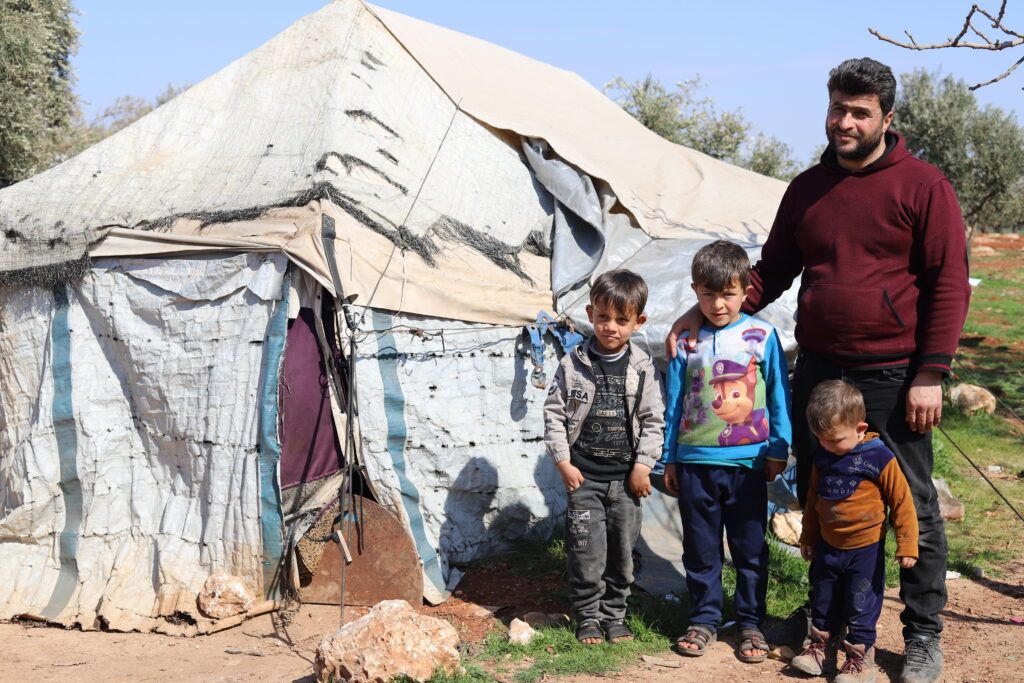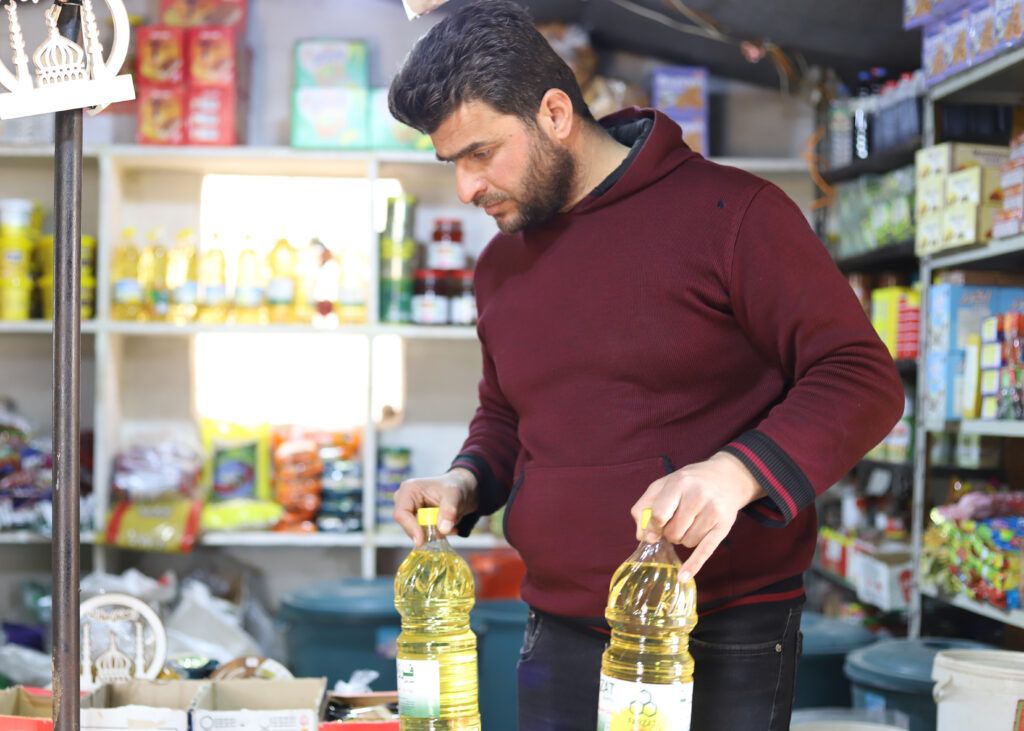 Stories
Stories
April 25, 2025 • 4 min read
Through the EU-funded SANAD programme, GOAL is supporting displaced families like Khaled Al-Hassan’s—who, despite welcoming the end of conflict, cannot return home. Years of war have left his village in ruins and infrastructure destroyed, making safe return impossible. With shelter support and food cash assistance, Khaled and his family can meet basic needs with dignity and begin rebuilding their lives with greater resilience.
Life Before Displacement
Khaled Al-Hassan is a 38-year-old father of four from Kafr Roma, a town in the southeastern Idlib countryside in Syria. Before the war, Khaled worked tirelessly across various trades—carpentry, blacksmithing, construction, olive picking—anything he could to provide for his family. “I’m a jack-of-all-trades,” he jokes, but the reality is that his extensive resume is not perhaps by choice but by necessity.
When violence forced the young family from their home nearly five years ago, Khaled, his wife, and their four children—Batoul, Salam, Mohammad, and his youngest, also named Mohammad—were displaced to a camp in Jabal Killy.
“I work according to the available job opportunities, meaning I don’t have a stable income,” Khaled explains.
“Life is tough, and our circumstances are very hard. But I have one hope that I insist on achieving: my family must live, and my children must be educated, just like other children”.

Khaled Al-Hassan is a 38-year-old father of four from Kafr Roma, with his children—Batoul, Salam and Mohammad in Jabal Kill displacement camp.
The Reality of Return
For displaced Syrians like Khaled, the fall of the Assad regime sparked cautious optimism. But returning home revealed a devastating reality.
“When liberation took place, we couldn’t contain our joy, and a new hope for return arose in our lives, with a deep yearning for the land, the house, the neighbours, and the olive groves,” Khaled recalls.
“But soon, we were shocked to find that Kafr Roma had become a ghost town… They had cut down all the olive trees…which was enough for our dreams and hopes to turn into mere mirages, and our joy turned into mourning”.
With no home left to return to, little infrastructure, and only 10% of houses even partially habitable, Khaled and thousands of others remain in camps, facing unrelenting hardship.
Daily Struggles in Displacement
The challenges of displacement are relentless—scarce job opportunities, rising prices, unstable markets, and a lack of basic necessities like heating fuel and medicine. Khaled’s story highlights the impossible choices families must make daily.
“The instability of prices and markets, the shortage of fuel, as well as the unstable security situation, all of these factors hindered our ability to plan for a clear future”, explained Khaled.
“There was great difficulty in securing the needs of a whole family… The priority in our purchases was bread, medicine, sugar, and tea. We needed three bags of bread loaves daily, and many days we couldn’t afford to buy them.”

Khaled Al-Hassan -38 years old- buys food at the market in southeastern Idlib countryside, after receiving GOAL’s food cash assistance.
A Lifeline from GOAL
As winter approached, Khaled was consumed with worry about keeping his family fed in their worn-out tent. That’s when GOAL’s food cash assistance, funded through EU support, arrived as a critical lifeline.
“We faced many daily problems and difficulties, such as the bitter cold, frost, strong winds, and the tents flooding with water. All of these made winter a yearly nightmare until GOAL provided cash assistance, which allowed us to buy winter clothes for our children and a meal with chicken or meat and perhaps buy some fruits and sweets for the children.”
This modest support brought not just food, but dignity. For Khaled, it meant temporary relief and a chance to smile again—if only for a moment.

Khaled Al-Hassan meets with the GOAL Syria team, which provides cash assistance to displaced families to help them buy food and critical winter essentials.
The Road Ahead
Still, the challenges continue. Khaled speaks of soaring prices, limited access to food, and fears about the future.
“Of course, we are happy with GOAL support from the food cash assistance, as it gave us some security, but a lingering feeling takes away from our joy about the liberation. We are now suffering from rising prices… Add to that the chaos, the instability, and the lack of basic necessities of normal life and its requirements in most of the liberated villages and towns, which prevents many, especially the poor like me, from returning.”
Despite everything, one desire remains stronger than all others: the longing to return home.
“There is no wish greater than the wish to return home…However, my longing, yearning, and dreams are often met with intense anxiety about the impossibility of returning to the town. I carry many fears, like many other displaced people, about the cessation of support from organisations. I fear we may be from the forgotten areas and return to square one.”
The Ongoing Need
Khaled’s story is just one among millions in Syria. His words lay bare the emotional and physical toll of displacement—and the urgent need for sustained humanitarian support. Thanks to the support of the EU and other donors and partners, GOAL continues to deliver critical aid like food cash assistance to help families like Khaled’s. But the needs are immense, and the future remains uncertain.
Without continued and increased international support, families living in camps will remain trapped in cycles of poverty, grief, and fear.
